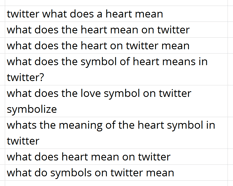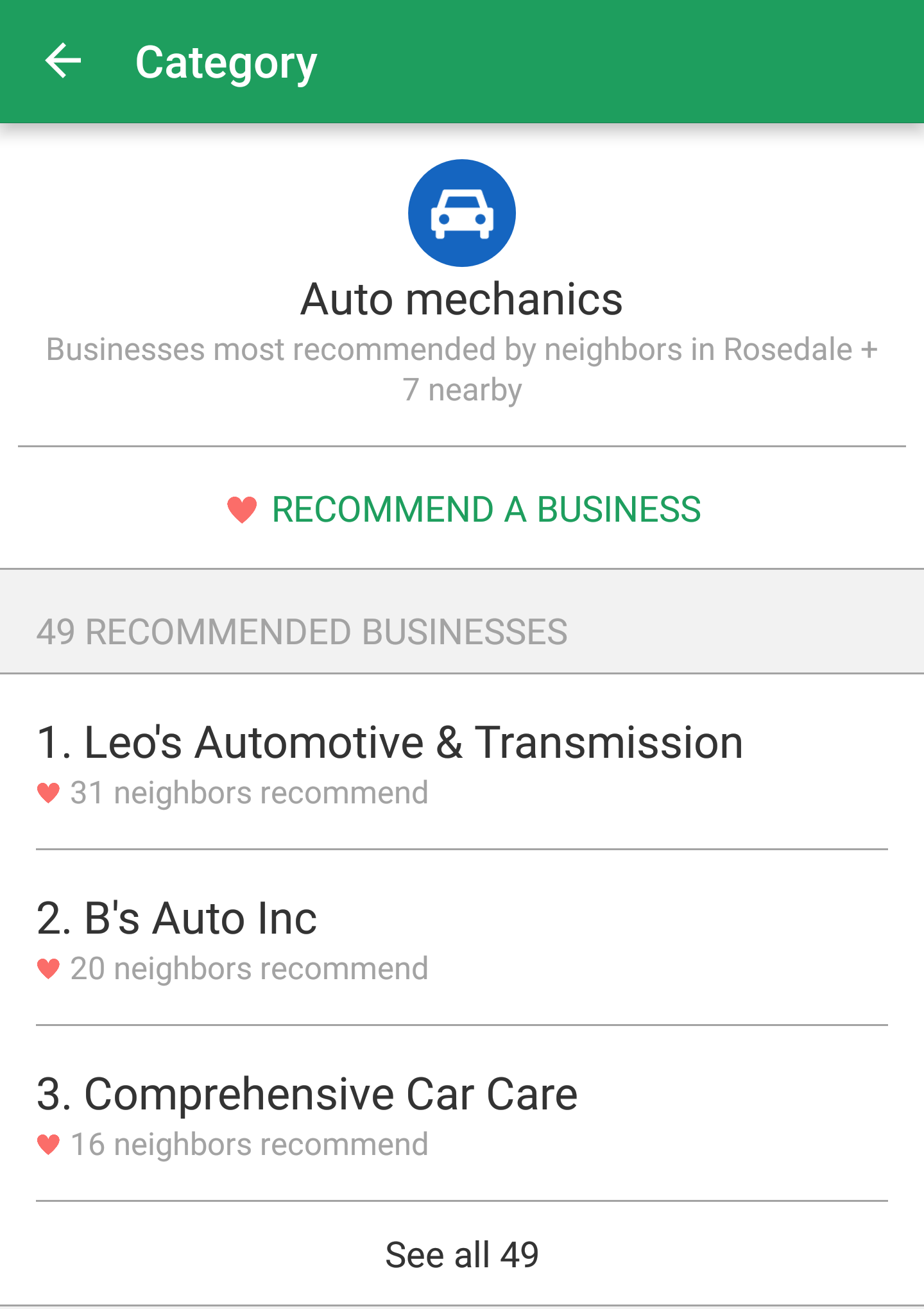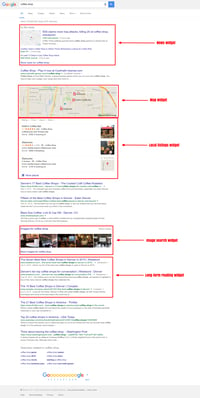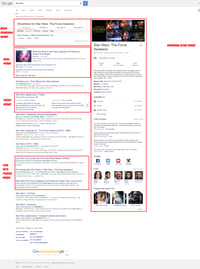 Coming up at the top of a Google search made by the owner of a company does not mean that the company’s site has is set up properly to attract customers. Gone are the days when Googling “medical spa” would bring up the site with the most mentions of the words “medical spa" stuffed into its pages. Now, Google search is heavily personalized, and conducting searches on just one person’s computer will not reflect whether or not a site has search visibility that will reach prospects. Unfortunately it's still a common practice: many company owners and marketing directors still can't help themselves from doing "just a little bit of Google searching" themselves to try to "eyeball how we'll they're doing." Unfortunately, this only leads to a highly inaccurate understanding of your actual marketing performance, which can lead to potentially disastrous strategy decisions down the road. Let's look at 6 specific reasons, with examples, of why "Googling your keywords" can lead to such a wildly inaccurate understanding of your marketing effectiveness.
Coming up at the top of a Google search made by the owner of a company does not mean that the company’s site has is set up properly to attract customers. Gone are the days when Googling “medical spa” would bring up the site with the most mentions of the words “medical spa" stuffed into its pages. Now, Google search is heavily personalized, and conducting searches on just one person’s computer will not reflect whether or not a site has search visibility that will reach prospects. Unfortunately it's still a common practice: many company owners and marketing directors still can't help themselves from doing "just a little bit of Google searching" themselves to try to "eyeball how we'll they're doing." Unfortunately, this only leads to a highly inaccurate understanding of your actual marketing performance, which can lead to potentially disastrous strategy decisions down the road. Let's look at 6 specific reasons, with examples, of why "Googling your keywords" can lead to such a wildly inaccurate understanding of your marketing effectiveness.
1. Search Result Pages Don't Follow Standard Ranking Anymore
Ten years ago, all Google search result pages looked the same: there were links to ten different web pages, with paid ads at the top. But more and more layout changes and other "widgets" have snuck in to the search result pages over time. There are map widgets, local listing / review widgets, knowledge graph widgets, news widgets, Twitter widgets, image search widgets, long-form reading widgets, movie listing widgets, app install widgets, and more. Here's two search result pages as examples (click for larger images):
Search results for "coffee shop"
Search results for "Star Wars"
In both of these examples, three-quarters search result pages are filled with display widgets that don't follow the standard "1-10 web page rank" of traditional keyword ranking. In fact, having a traditionally high-ranking web page for queries with large numbers of custom result widgets like this isn't even useful, because even a well-ranking web page still gets pushed halfway down the page regardless. And on the flip side, having good visibility in these custom widgets that don't follow a "1-10 keyword rank" system is even more valuable for exposure and click-throughs than those search results that do follow a traditional keyword rank system.
2. Search Results are Highly Personalized
These days, Google’s search results are keyed in to the searcher’s location, browsing history, social data, type of device (e.g. laptop, tablet, or smartphone), and even the searcher’s OS. In fact, there are over 200 factors that Google looks at as the user is typing in a word or phrase. This is why someone in Denver who searches for “Joe’s Plumbing” will get a different result than someone in Des Moines – and why a husband and wife using different computers will get different auto-complete suggestions while searching for laptop cases. Using just one computer does not provide objective data.
One of the factors Google looks at is whether or not a user is signed in, either to Google Chrome or just Google itself. In addition to tailoring search results based on a person's location, Google searches also increasingly tailor their results based on that person's past browsing and social history in their Google account. Personalization runs deep in Google’s search results.
3. Are You Sure You Actually Know What Your Prospects Are Searching For?
Additionally, search ranking often does not reflect what people actually are searching for. Companies will often choose a list of keywords that they think their customers are using, but their customers are using something entirely different. For example, a medical spa may list “medical spa” as a top keyword that it wants to be found under, but it's possible that its prospects are actually searching for the names of individual procedures. Sprinkling an arbitrarily chosen keyword throughout a website that users are not searching for does not help SEO.
Learn more about best practices for SEO in our free e-book with tips from SEO experts
Most of the time, the only thing a particular keyword search will do is point the business owner to what they want to see, rather than the reality of their website’s search visibility to their target audience. And the reality is that not only is Google highly personalized but also that customers and prospects are searching for things that are not necessarily what the business owner thinks they would use. In fact, according to Google’s own engineers, 20 percent of search queries every day have never been searched for before.
Here's one example: one company we know was googling their company's slogan and excited to see that their company showed up as the first search result for it. But unfortunately it was a false hope, because:
- Nobody else besides that company wrote anything with that tagline in it anyways
- Nobody outside of the company itself searched for that tagline anyways. It does no good to rank for a term that nobody is searching for.
Another example: we once wrote a blog article explaining the new heart icon in the Twitter interface. The article brings in a large amount of organic search traffic for us, but the variety of keywords and phrases that people use even for that one specific topic is enormous:

If we had tried to guess ourselves how specifically people would search for this topic, we would have most likely fixated ourselves on a particular phrase and based our impression of our visibility on that phrase alone, which would have most likely led to a wildly inaccurate understanding of how people are actually finding us.
4. Google Isn't Necessarily Where People Are Browsing Nowadays
 It's important to understand your prospects user behavior and how they search out businesses like yours — not everyone goes to Google to find what they're looking for! If you're a restaurant, a great, highly-reviewed Yelp profile might be more important than your Google website rank. If you're a doctor, dentist, plumber, or roofing company, building up a large number of recommendations and reviews on Nextdoor is massively important. If you do consulting or other types of B2B services, your prospects most likely choose partners based on pre-existing relationships and recommendations from others, rather than Google-searching for someone. And when it comes to smartphone usage (and smartphones are the single most important screens in most peoples' lives nowadays), people spend more time in Facebook alone than all mobile websites combined. Understand your prospects' decision-making process and meet them where they're at, rather than where you think they are.
It's important to understand your prospects user behavior and how they search out businesses like yours — not everyone goes to Google to find what they're looking for! If you're a restaurant, a great, highly-reviewed Yelp profile might be more important than your Google website rank. If you're a doctor, dentist, plumber, or roofing company, building up a large number of recommendations and reviews on Nextdoor is massively important. If you do consulting or other types of B2B services, your prospects most likely choose partners based on pre-existing relationships and recommendations from others, rather than Google-searching for someone. And when it comes to smartphone usage (and smartphones are the single most important screens in most peoples' lives nowadays), people spend more time in Facebook alone than all mobile websites combined. Understand your prospects' decision-making process and meet them where they're at, rather than where you think they are.
5. Don't Be At the Mercy of Google
What's one of the biggest risks that a company can bring on themselves? Making their success or failure dependent on an entity outside of their control, such as a person, a company, or government. If that external entity makes an unexpected and unannounced change, it could have dire consequences for the company dependent on them. That's why your financial advisor always recommends that you diversify your investment portfolio.
When people plan their entire customer acquisition strategy around SEO, they are highly exposed and dependent on one single entity — Google — and are completely at their mercy. And unexpected and unannounced changes are "business as usual" for Google — they introduce hundreds of search rank algorithm changes per year. Many of these changes aren't even announced until after the fact — sometimes not until weeks later. Some changes are never publicly admitted to at all. Just like you wouldn't base your entire investment nest egg in one single company or industry prone to constant and unexpected changes, you shouldn't plan your entire marketing strategy about ranking well for keywords on a web service which does the same thing.
6. Search Traffic is Just the First Step
Ultimately, though, trying to play the SEO game as a sole source of leads and sales is not sufficient. Search rankings do not equal leads or sales. Companies instead need to focus on lead generation as a foundational metric, figure out which content is converting the best, and from there determine the topics and keyword areas covered in the high-conversion content. This is what will help companies attract the prospects right for their businesses, rather than playing a shell game that may or may not lead to conversions. One way to do this is to create more content around topics and keywords that get the most actual traffic on your website (rather than guessing which ones get better page rank), as well as craft strong calls to action that entice visitors to sign up for a piece of premium content or subscribe to the blog. The contact information from these signups then populates your sales funnel.
Don't Lose the Forest Through the Trees
SEO and Google rankings are not everything, and they certainly shouldn't be considered the cornerstone of any marketing program. They are a part of it, and good SEO helps companies' websites pop up in results when their target audiences are searching. But to "Google your keywords" and assume that, just because one computer shows the company in the top of search results for an arbitrarily chosen query that every other computer will as well, is bad SEO practice that will not produce leads or new business. Focus on defining — in detail — the wants and needs of your target audience, make sure all your marketing content brings tangible value to them in their own lives, build up your earned audience through email and social media, and make sure your website user experience and new customer on-boarding experience is as frictionless, positive, and pleasant for your prospects as you can possibly make it. Then, and only then, will you have a sustainable and scalable long-term go-to-market strategy that works.


